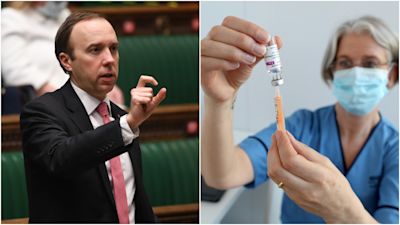Covid: Vaccine supply issues caused by need to retest 1.7million doses and India delivery delay

Video report by ITV News Health Editor Emily Morgan
Forthcoming vaccine supply issues in the UK have been caused by a need to retest almost two million doses and by delivery delays from India.
Health Secretary Matt Hancock, updating MPs on an expected "significant reduction" in vaccine supply, said there's a "delay in the scheduled arrival from the Serum Institute of India".
He added: "In the last week, we've had a batch of 1.7 million doses delayed because of the need to retest its stability.
"Events like this are to be expected in a manufacturing endeavour of this complexity and this shows the rigour of our safety checks."
Listen to the latest on the vaccine rollout our politics podcast, Calling Peston:
Vaccine supply issues are expected to hit the UK for a month from the end of March.
A letter to local health leaders in England asked vaccination centres and community pharmacy-led services to close unfilled bookings and “ensure no further appointments are uploaded” to booking systems in April.
NHS bosses said that as a result of the supply issues, people under the age of 50 should only get the jab if they are in a priority group, meaning younger adults could face a longer wait to be be vaccinated.
Matt Hancock provides further details on the UK's vaccine supply issues:
However, Mr Hancock insisted the UK is "on track" to meet its vaccination targets, first doses will be carried out as well as second doses, and no appointments would be cancelled due to the shortage.
"The targets to offer a vaccine to everyone aged 50 or over by April 15 and to all adults by the end of July, I can confirm we are on track to meet both of these targets," Mr Hancock said.
Downing Street did not deny a Serum Institute of India's suggestion that the Indian government was temporarily blocking exports of the AstraZeneca vaccine.
The prime minister's official spokesperson said: "I would point you back to the statement the Serum Institute put out, notably where they said they have delivered vaccines to us and they will do so again in the future."
Pressed on whether the Indian government is blocking exports, they said: "I would point back to what the Serum institute have said and the fact that they are one of the manufacturers of the Oxford/AstraZeneca vaccine.
"We produce it here in the UK and it's produced elsewhere as well so we will continue to work with the manufacturers of the vaccine."
Asked if the UK government is in talks with the Indian government, he said: "We're in constant contact with other governments around the world."
AstraZeneca said on Wednesday evening: “Our UK domestic supply chain is not experiencing any disruption and there is no impact on our delivery schedule.”
A spokesperson for the Serum Institute of India told the BBC: “Five million doses had been delivered a few weeks ago to the UK and we will try to supply more later, based on the current situation and the requirement for the government immunisation programme in India.”
AstraZeneca has partnered with the institute, which is the world’s largest vaccine manufacturer, for supplies to the Indian government but also to other countries, including low and middle-income ones.
Speaking on Thursday morning, Housing Secretary Robert Jenrick told the BBC: “We’re going to move forward as quickly as we possibly can but it won’t be as fast as we might have hoped for a few weeks, but then we have every reason to believe that supply will increase in the months of May, June and July.”
There are fears reduced vaccine supplies could slow the easing of lockdown restrictions, but speaking to ITV News, Mr Jenrick said the lockdown roadmap plan will not be delayed.
More than 25 million people in the UK have now received a first dose of a coronavirus vaccine.
Dr Simon Clarke, associate professor in Cellular Microbiology at the University of Reading, said the “ripple effects" of the delay "could last for months”.
“It will undoubtedly make the meeting of the target dates for lifting restrictions more difficult than they otherwise would have been,” he said.
“By pushing back the under-50s first doses, their second doses are also being pushed back.
“If full vaccination becomes required for holidays abroad or even more mundane things like going to the cinema, millions of younger people may end up being excluded from participating for the whole summer.”
It comes as government officials and healthcare experts sort to reassure the public over the Oxford/AstraZeneca vaccine after several European countries halt their jab rollouts amid reports of blood clotting, though no link has been established with the vaccine.
The European Medicines Agency (EMA) is expected to meet on Thursday to discuss the AstraZeneca vaccine, after a dozen European countries suspended rollout of the jab over isolated cases of blood clotting.
EU threatens to halt vaccine exports to UK and other countries with high vaccination rates
Covid vaccine tracker: How many people have been vaccinated in the UK and when will I get it?
A Pfizer spokeswoman said deliveries “remain on track” for the first quarter of its 40 million dose agreement with the UK, with a “steady supply of vaccines” delivered to the nation.
Elsewhere, the UK faces a possible block on doses from the European Union after Ursula von der Leyen warned the bloc “will reflect on whether exports to countries who have higher vaccination rates than us are still proportionate”.
The European Commission chief said she wanted “reciprocity and proportionality” in exports, pointing out that 10 million doses of vaccine had gone from the EU to the UK.
Mr Hancock said the supply of vaccines to the UK from EU production facilities was “fulfilling contractual responsibilities and we fully expect those contracts to be delivered on”.
Listen to our coronavirus podcast: